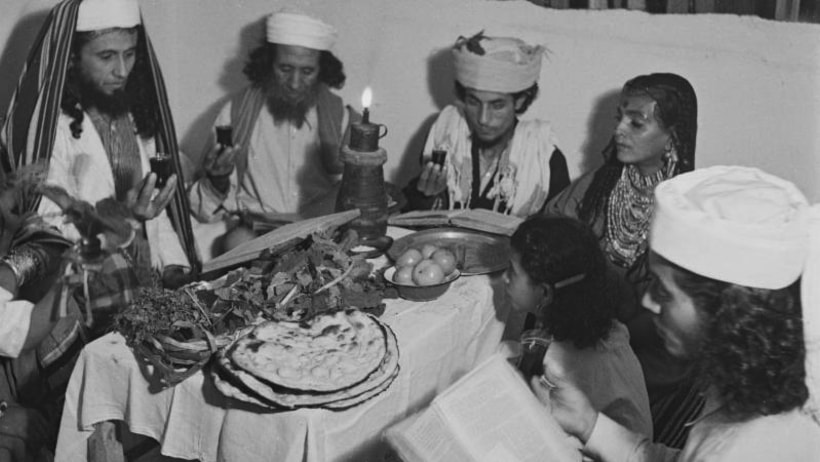Oasis Songs: Musings from Rav D
April 28, 2016 / 20 Nisan, 5776
Our first sedarim (seders) here in Portland were wonderful and each had a distinct and touching individuality. As wonderful as they were, I still inevitably think about the seders of my childhood.

My grandparents crammed a horseshoe of tables into their dining room, which allowed them to magically fit more than forty people into their modest middle-class home. Cream linens festooned the tables, and each place setting was laden with crystal and silver and fine china. Everyone had a real cloth napkin–ironed to sharp creases, I might add. With all that work sunk into napkins, my grandmother had no choice but to teach me how to use one so they wouldn’t get dirty! Apparently, there is an art to dabbing, and I was taught it.
Then there were the tunes that I heard nowhere else. These were found, along with musical scores, in the hardback, grey-covered Union haggadot we used, most of which were well stained with wine. Laughing, my cousins and siblings and I would cause just enough mischief while tearing the living room apart. I can still see my grandfather standing there saying, “you are getting cold, colder…warm, warmer,” as his kind voice guided us to the carefully hidden afikomen.
No matter how lovely the seders of today were, I can never forget my mother’s fabulous shomtort (schaum torte), a dessert I have never seen in a restaurant, more’s the pity. Her “cloud cake” was a mess of whipped meringue, baked into a sugary shell that crackled beneath your teeth until it gave way to a gooey interior. Into that unbelievable shell, she stuffed a mess of berries and whipped cream. Heavenly simplicity itself.
It was all wonderfully enchanted in the way a child’s eyes can most readily discern. Familiarity, the curse and challenge of adulthood, can blind us to how fabulous life truly is. I suspect that is why Judaism places so much emphasis on gratitude. It is the spiritual practice which most closely parallels the novelties of childhood, and leads us adults back to the magic of the moment.
Even so, it’s never quite the same. That gap between what we experience as adults, and what we encountered as children has necessarily changed. It’s not a question of which is better–such a question is meaningless and unhelpful. Still, it’s useful to notice the contrast, and thereby witness how time flows through each of us.
While dwelling on this difference between adult and childhood experiences, I flashed back to Powaqqatsi, a moving film that showcased in flashing images hundreds of examples of human craftsmanship, spirituality and creativity. That film took my breath away.
Wouldn’t it be marvelous if a cinematographer could flash before our eyes a thousand Pesach seders, across a dozen lands and somehow capture for our enjoyment the emotions each called forth from their participants? Our best seders, after all, are examples of much craftsmanship, creativity and spirituality.
That is just one of the reasons that the story of Passover is a never-ending one. Certainly, the theme of freedom is endlessly fascinating. We all have a deep need for freedom–it is the truest way we can express our inherent dignity and the worthwhileness of our lives. Show me someone without freedom, and I’ll show you a degraded person.
Passover, as my personal memories remind me, contains far more than merely the enduring theme of freedom. Our seders are microcosms of society writ large, rich with the dynamics of family and friends. I suspect we all play a certain role in the seder, just as we do in life. Seders highlight the freedom we yet might claim.
This fullness of ritual is one of the reasons I love religion, and Judaism in particular. It is mine, yes. It is also the world’s, this never ending story that continues to capture the imagination of countless people, to nourish us, and to connect us across generations. It makes one pause.
Coming up on Saturday we’ll get to pause together. Rabbi Isaak will share with us his and Carol’s overseas adventures, and tie the stories of those “disappeared” Jewish communities to our Yizkor memorial. That seems most appropriate. As CK Chesterton famously noted, “Religion is a democracy where the dead get a vote.” I’m glad the past still has a voice and hope you’ll join us as Rabbi Isaak calls forth the stories our people told in countries as far sprung as Spain and North Africa.
Chag sameach,



